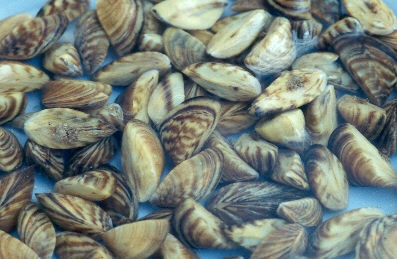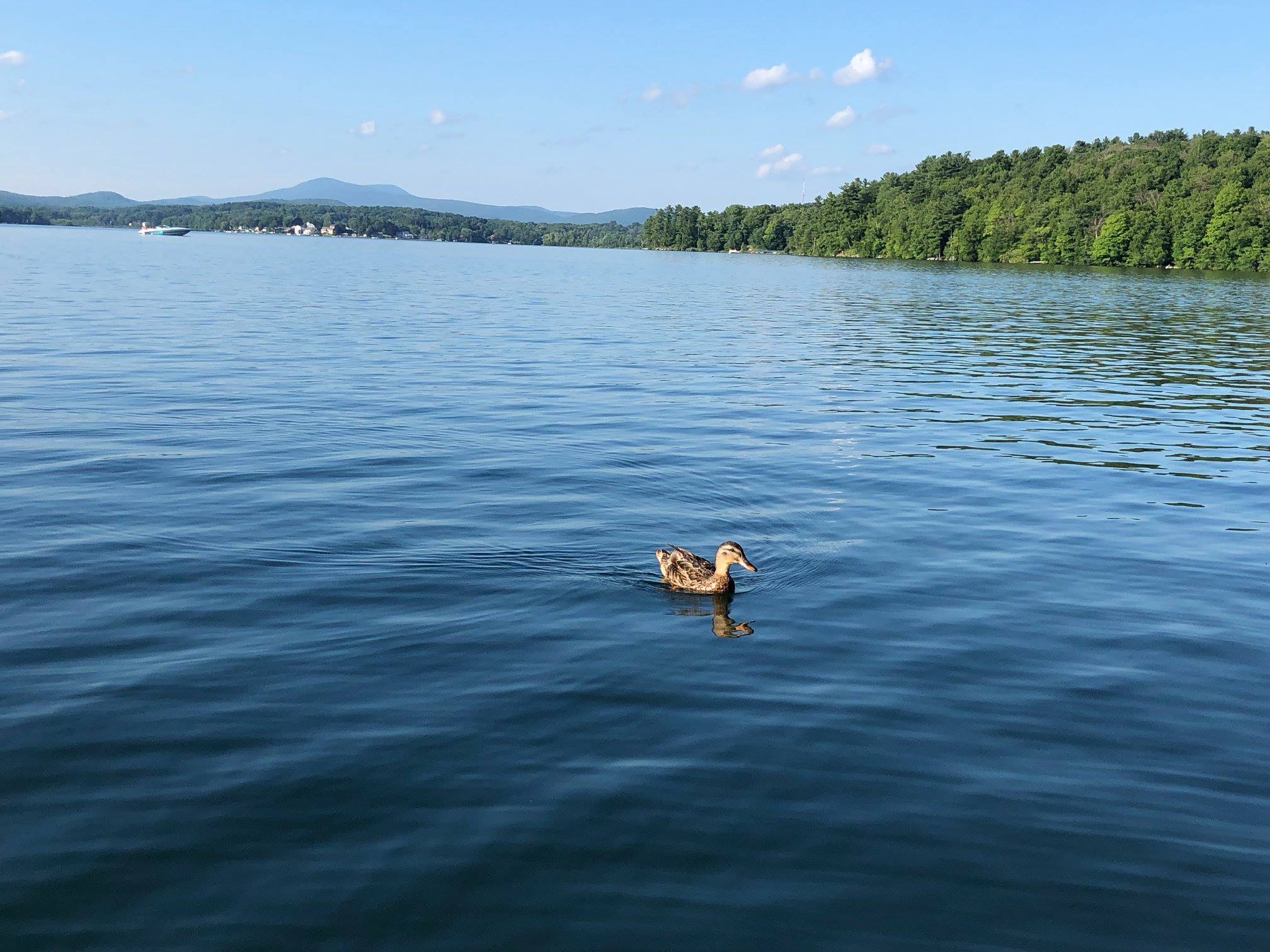Aquatic invasive species interfere with recreation and damage the ecology of lakes. The diverse aquatic plant community at Onota Lake unfortunately includes several invasive non-native, species: Eurasian Watermilfoil (Myriophyllum spicatum), Curly-leaf Pondweed (Potamogeton crispus), European Naiad (Najas minor), Water Chestnut (Trapa natans) and Common Reed (Phragmites australis). Invasive aquatic animals also threaten the lake: Asian clams (Corbicula fluminea) were discovered at Onota Lake in 2021; Zebra mussels (Dreissena polymorpha) and Quagga mussels (Dreissena rostriformis) have not been found in Onota Lake so far but potentially are a much greater nuisance and more damaging to lake ecology. LOPA volunteers work with the City of Pittsfield to help control the aquatic invasive species present in the lake and prevent the introduction of new ones.
READ MORE ABOUT INVASIVE PLANTS
Eurasian watermilfoil is a non-native, exotic species and has been the primary nuisance species of concern at Onota Lake. Eurasion watermilfoil is documented to grow in dense stands throughout the water column and form surface mats when fully grown. It tends to outcompete the native plant assemblage and become the dominant species. Its dense growth interferes with boating as well as fishing, swimming, and aesthetics. Its negative impact has been controlled in recent years by herbicide applications, and most recently by the systemic herbicide ProcellaCor
Curlyleaf Pondweed can become problematic in the early season before dying down naturally in July. European Naiad is low growing plant that is less of a nuisance that emerges in mid-summer and propagates mostly by seed. These invasive species have been controlled in the past respectively by early season and mid-season applications of the contact herbicide diquat.
A pioneer infestation of Water Chestnut was discovered in 2003 in an isolated area of the lake north of Dan Casey Causeway and has been controlled by an aggressive program of hand harvesting by LOPA volunteers.
Common Reed has been present in the southwest cove of the lake for many years, but recently is spreading to many other parts of the lake. The City is considering a demonstration project to control a small stand of Common Reed with an appropriate systemic herbicide.
READ MORE ABOUT ZEBRA MUSSELS
Zebra Mussels: A Menacing and Dangerous Invader On Our Doorstep
Zebra mussels pose a significant environmental and economic threat. No bigger than the size of a dime, zebra mussels cause profound and irreversible damage to lakes and native ecosystems. Zebra mussel infestations have been documented in 32 states and even worse, they are now on our doorstep.
In July 2009, zebra mussels were discovered in Laurel Lake in Lee/Lenox, MA where they reproduce and colonize today. Zebra mussels have also been reported in water bodies within the three states surrounding Berkshire County including New York, New Hampshire, and Connecticut.
Described as “the most troublesome freshwater biofouling organism in North America” by U.S. Army Corp of Engineers, they attach themselves to manmade structures such as pipelines. They destroy boat engines, foul beaches with sharp shells, and damage boat ramps and docks. Once zebra mussels are introduced into a waterbody, it is nearly impossible to prevent them from spreading elsewhere. The best and only protection is to keep them from entering our lake waters altogether.
Lake Onota and its sister lakes (Pontoosuc Lake and Richmond Pond) are literally one boat away from an irreversible infestation. These nasty hitchhikers are just looking for a ride. They are inadvertently introduced by recreational boat users from one body of water to another. They will attach themselves to boat hulls, anchors and chains, trailers, equipment, bilge tanks and engine drive units.
The good news? There is none. We can’t kill this critter. Are you beginning to feel the size and significance of this threat? The stakes could not be higher. This narrative may seem hopeless, but there are things we can do. Please join our campaign and decontaminate your boat before entering Lake Onota. Our best and strongest intervention is prevention. Period. You can do this by following clean, drain and dry procedures.
Clean: Inspect your equipment and gear. Remove all plants, mud, and debris and thoroughly clean equipment and gear that have come in contact with your boat from rivers, lakes or bays. A quick trip to the car wash to use a high-pressure sprayer can help clean crevices and hidden areas.
Drain: Drain or eliminate all water from equipment and gear before leaving our Lake.
Dry: Allow time for your boat to dry completely (for at least 5 days if possible) before using again in other waters.
Please cooperate and assist the City of Pittsfield boat stewards at the Burbank Park boat ramp. They will be collecting data on boat usage and providing information to boaters on Massachusetts clean boat requirements. A listing of zebra mussel invested waterbodies is available at the boat ramp kiosk.
We invite you to become an ambassador of our efforts to keep zebra mussels from entering Lake Onota. Learn more about the Lake Onota Zebra Mussel Prevention Fund.





